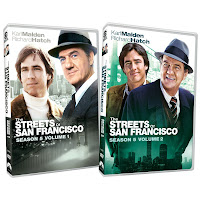the traveler's resource guide to festivals & films
a FestivalTravelNetwork.com site
part of Insider Media llc.
November '12 Digital Week I
- Details
- Parent Category: Film and the Arts
- Category: Reviews
- Published on Monday, 05 November 2012 05:00
- Written by Kevin Filipski
Americano
(MPI)
Talent must skip a generation: son of French director Jacques Demy and his more talented wife Agnes Varda, Mathieu Demy, wrote, directed and stars in this routine drama about a Frenchman returning to California, where he grew up, after his mother dies; Demy doesn’t give it the urgency which might make it more than merely meandering.
Salma Hayek makes a savvily sexy hooker, but another bad-seed celebrity offspring, Chiara Mastroianni, rivals Demy’s onscreen dreariness. The Blu-ray image looks fine; lone extra is a Demy interview.
(Warners)
Will Ferrell and Zach Galifianakis play opposing senatorial candidates in this sporadically funny comedy that shows how absurd and infantile American politics is—but do we need a lame Ferrell flick to tell us (and one with 11 minutes of raunchier material on Blu-ray)?
Ferrell basically gives a foul-mouthed Dubya impression, Galifianakis is an unwatchably campy rival, and running gags of punching infants and dogs wear out before they begin. The Blu-ray image is good; extras include deleted scenes and a gag reel.
(Anchor Bay)
I’m no fan of David Lynch, but he’s infinitely preferable to his director-writer daughter Jennifer Lynch, who made the abominations Boxing Helena and Surveillance. Her sordid latest follows a cab driver who murders a mother and keeps her young son in chains until they gradually evolve into a sadistic sort of father/child relationship.
The many gory killings are reprehensible and pointless; I don’t get moralistic about movies, but in this case, I’d make an exception. Why Julia Ormond bothers to make films with Lynch—she was also in Surveillance—is head-scratching. The Blu-ray image is excellent; extras are an alternate murder scene and Lynch’s commentary with actor Vincent D’Onofrio.
(Anchor Bay)
In this perverse sexual fantasy about a homely teenage girl whose hormones cause self-destructive behavior—written and directed by a man, of course: Richard Bates, Jr.—Annalynne McCord gives a fearless performance as Pauline, a typical loner who ends up acting on increasingly grotesque dreams of gore-filled glory.
Even if Bates directs the fantasy sequences as titillation, McCord grounds Pauline’s behavior in an uncomfortable reality. The Blu-ray image is top-notch; lone extra is a Bates/McCord commentary.
Night of Dark Shadows
(Warners)
On the heels his television show Dark Shadows’ success, Dan Curtis quickly made two features in 1970-1 that captured the series’ flavor. Unlike Tim Burton’s 2012 reboot, Curtis avoids camp but the horror isn’t horrific enough to overcome the oppressive gothic atmosphere.
Overall, the movies nicely do what they set out to, and there’s a beguiling debut by future Charlie’s Angel Kate Jackson—her perfect face, in close-up, is what hi-def is for.
(Eagle Vision)
Grammy-winning jazz guitarist Pat Metheny displays his amazing six-string versatility in this special musical project where he plays along a series of newly-made “instruments” built by imaginative inventors.
Although some of the music on this nearly three-hour disc has a certain sameness to it, the tone and precision of Metheny’s guitar playing remains a wonder to hear after so many decades. The Blu-ray image looks solid; extras include additional performances and a Metheny interview.
(Arthaus Musik)
Enrique Sánchez Lansch’s probing 2007 documentary tackles the moral quandary of members of the Berlin Philharmonic from 1933 to 1945, when the ensemble became an official cultural attaché for Hitler and Goebbels.
Lansch interviews the last surviving members from that time—93-year-old Hans Bastiaan and 84-year-old Erich Hartmann—and their often painful reminiscences vividly inform the narrative of a cultured nation which turned a blind eye to inhumanity to preserve itself at a horrible human cost. The hi-def image is decent; lone extra is a 10-minute film of renowned conductor Wilhelm Furtlanger leading the orchestra in a Wagner prelude in 1942.
(Kino)
If you’re in the mood for a badly written, directed, acted and photographed 1964 Z-movie that does nothing in 70 minutes except conjure memories of bad Ed Wood anti-spectaculars, then there’s nothing I can say except: enjoy.
Otherwise, Santa—rightly on “Worst Movies Ever” lists—won’t satisfy anyone except unpicky kids who want to watch anything Christmassy. You’ve been warned. The visuals, which look abominable, aren’t much better on Blu-ray; though there are 45 minutes of archival footage, it would have been fun to have a commentary by the MST3000 guys.
Coma
(Sony)
Novelist Robin Cook’s medical thriller was turned into an effective if silly movie by Michael Crichton in 1978, with beautiful Genevieve Bujold as its star. Now, 34 years later, we get this overlong, bloated, occasionally interesting TV movie starring Lauren Ambrose and Stephen Pasquale as doctors who discover devious doings going on at their hospital.
The plot twists and turns are as ludicrous as they were in the original, but the earlier movie’s faster pace has been ruined by a pokey 160-minute mini-series designed for a four-hour TV time slot.
Elena
(Zeitgeist)
A masterly dissection of the “new” Russia—in which oligarchs outpace the working classes at a rate even greater than the good ol’ USA—Andrey Zvyagintsev’s drama is best when silent: when all else falls away and we are left with the naked pain and desperation of the title character, a former nurse married to a gazillionaire whose own family is ignored by her rich husband.
Too bad Philip Glass’s risible and self-parodic music downgrades every scene it’s heard in; happily, Zvyagintsev sensibly builds the most powerful moments—beginning with the evocative opening shot—with silence that speaks volumes more than broken Glass. The lone extra is a 30-minute Zvyagintsev interview.
(Film Movement)
The French resistance is seen through a new lens in Ismael Ferroukhi’s drama set at the Paris Mosque, where the Muslim community assisted Jews to escape the Nazis. Despite melodramatic touches, Ferroukhi builds tension without sacrificing credible psychology as his young protagonist Younes becomes politically—and morally—engaged. Tahar Rahim, memorable in Jacques Audiard’s prison yarn A Prophet, plays Younes as an innocent naïf, a blank slate with which the director fills in Younes’ interior complexity.
This tense chronicle shows a multi-faceted Vichy atmosphere through the eyes of people rarely encountered onscreen: Muslims putting their lives on the line to defeat Hitler.
(Criterion)
Roman Polanski’s 1968 shocker, from Ira Levin’s novel, is one of the most frightening horror movies ever made. Polanski’s matter-of-fact direction makes the reality of Rosemary (Mia Farrow), her husband (John Cassavetes) and baby—spawn of Satan?—even more horrifying, and when the movie spills over into the supernatural, there’s no turning back, despite being couched in a plausible New York milieu.
Extras include new interviews with Polanski, Farrow and producer Robert Evans and Komeda Komeda, a portrait of composer Krzysztof Komeda, who wrote the eerie score.
(CBS)
Karl Malden and Michael Douglas, a hit duo, broke up at the beginning of the 1976-7 season—Douglas, who won an Oscar producing One Flew Over the Cuckoo’s Nest, was carving out a big-screen career—and handsome Richard Hatch came on board. The new partners did well, but audiences dwindled, and this became the series’ last season.
A smattering of decent episodes (out of 24) includes the opening two-parter, The Thrill Killers, which sees Douglas’s exit and Hatch’s entrance; there’s amusement in nice girls Patty Duke and Susan Dey as cold-blooded murderers.
(New Yorker)
Jannicke Systad Jacobsen’s caricatured comedy about a teenage girl whose hormones rage uncontrollably might have made a fun, insightful short, but stretched to 72 minutes—though fairly compact for a feature—it has little to say about Jacobsen’s protagonist, who spends her time fantasizing about sex or trying to rub herself raw.
Helene Bergsholm’s nuanced portrayal completely outclasses her writer-director’s film. Extras include deleted scenes and a director interview.
Joyce DiDonato: Drama Queens
(Virgin Classics)
American mezzo Joyce DiDonato, who puts on various guises in this entertaining collection of baroque arias sung by Queens and other royalty, is equally at home singing these extravagantly ornamented vocal works and contemporary music.
Alternating works by composers both familiar (Handel, Gluck, Monteverdi) and obscure (Cesti, Ormandini, Giacomelli), DiDonato has an uncanny ability to inhabit these women in a vivid musical journey, inestimably helped by conductor Alan Curtis and ensemble Il Complesso Barocco.
Newsletter Sign Up

Upcoming Events
No Calendar Events Found or Calendar not set to Public.





















